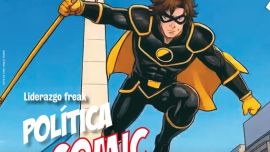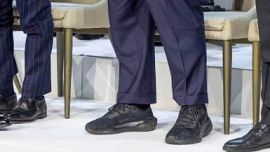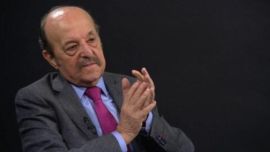It’s common for us to attribute more importance to what happens close to us. This “proximity bias” is absolutely reasonable, as things that happen in our close vicinity, or in our times, impact us more directly than things that are displaced. We are more interested in the romantic goings-on of our neighbours or coworkers than what a president or politician could be telling us about the future trajectory of public policy. And this complicates our analysis, reducing our capacity to put things properly into context, or by the same token allowing us to blow things out of proportion, in both cases reducing the space for critical judgment.
Argentines have become experts at ascribing outsized importance to our country and its socio-cultural figures, from football players to politicians. Javier Milei, the first-ever “anarcho-capitalist” president of Argentina, most definitely took the country, and the world, by storm, going from zero to hero to become a local and international leader of the “new right” that exudes an air of invincibility. The consensus opinion about him seems to be that he represents “something different” that is impossible to explain using our traditional cognitive tools in that the conditions for his success appear to be contrary to what experts and analysts assumed possible.
There can be no denying that Milei’s political success story is out of the ordinary. An ill-tempered economist with wild hair, he became popular on late-night cable-news shows given his affinity for foul language and argumentative aggressiveness. As ratings went up, his appearances became more frequent, as he graduated into prime-time broadcast television. Ultimately, he became president by beating two powerful and well-organised professional political machines – Juntos por el Cambio and the incumbent Unión por la Patria. Once in power, many forecast a short presidency and a string of social and political crises, together with inexperience and intolerance, which would finish with Milei’s political ascendancy. It sounded reasonable, there were serious doubts regarding his mental health, he counted with nearly no political experience, no political structure, had a miniscule number of legislators, no governors and no team. The libertarian promised chainsaw austerity and political revolution as he declared war on the “political caste.”
Even as he slashed spending and aggressively hiked utility bills, the president retained his levels of popularity. He’s managed to pass a sweeping structural reforms package while maintaining a budget surplus. Inflation, the main scourge of the population, has progressively fallen to levels not seen, or expected, in years. Milei, a political novice, has managed to position himself at the apex of the political food chain, allowing him to pick at the corpses of the coalitions that he forced to implode in order to try and structure his own national party, with Sister Karina in charge. As he waits for a “V-shaped economic recovery” that is nowhere in sight, he’s aiming at a powerful victory in this year’s midterm elections that will allow him to consolidate himself as the new leader of a large political grouping that stretches from the moderate centre to the far right, trying to knock Mauricio Macri off his perch.
And while all of this seems to confirm that he is indeed “something different,” there’s a lot that makes him just like most of the politicians out there. To start, President Milei has no problem in lying and uttering hypocritical statements consistently, taking advantage of the polarised nature of the political game to his own advantage. He manipulates statistics to his own liking and presents half-truths as conclusive in order to make self-serving points. He fills his mouth speaking of the political “caste” as the enemy he’s come here to oust, yet his cabinet and first-level officials are littered with lifelong politicians. He negotiates with potential legislative allies by promising posts, budget disbursements, and potentially even more nefarious tokens of exchange as is being currently investigated in the Edgardo Kuieder case. While he touts the suspension of official advertising budgets in order to eliminate the rotten incentives of the media, he uses the budget of state-owned companies to reward friendly journalists and punish those who are critical. His political structure is increasingly vertical — controlled by the “iron triangle” that includes the president, presidential chief-of-staff Karina Milei and star political advisor Santiago Caputo — and expects absolute allegiance. Dissent isn’t tolerated and “traitors” are digitally lynched by his “troll army.” During this moment of apparent invincibility, Milei and those closest to him are designing plans to “take it all” (i.e. “vamos por todo”), by which they mean absolute control of Argentina’s political system.
We’ve seen this before, many times. We could draw many parallels with the Kirchnerite era, where a messianic leader had an increasingly authoritarian bent as she tried to subjugate the political ecosystem and perpetrate herself in power. The level of hubris that overtook Cristina Fernández de Kirchner and her first-line officials could partially explain the pervasiveness of explicit corruption all the way to the upper echelons of government. At the end of the day, Cristina was unable to produce a winning electoral ticket and managed to earn the hatred of an important portion of society who voted for Macri mainly to push them out of the Casa Rosada. During Macri’s administration there was talk of “good-mannered Kirchnerism” in reference to the level of verticality with which the government was run, together with political exchanges used to maintain governability. While Macri’s Cambiemos coalition didn’t exhibit an authoritarian slant, they felt invincible immediately after the 2017 midterm elections when they felt they had “buried” Kirchnerism. In Alberto Fernández’s case, there was an explicit situation of domination by Fernández de Kirchner, but many of the “vices of the caste” that led to systems of corruption were maintained.
Bringing it back to Milei, at this specific moment in time and space it feels that he represents something totally different from what came before. The outsider who has come to torch the old ways and put in place a new socio-political system. Some suggest that he represents the end of the old paradigm exemplified by the concept of “la grieta” or deep polarisation, and that something new and unexpected will come next. My read is that Milei is not so different as we’ve led ourselves to believe. While he is eccentric and has a bizarre relationship with his sister and his “four-legged children,” ultimately he will converge toward more or less the same avenues of behaviour as his predecessors. His perfect armour will begin to exhibit chinks at some time, and his infallibility will become exactly the opposite. It’s a matter of time. He will show his thirst for power and many of his top-line officials will surrender to the temptations of corruption. He may be able to impose himself in this year’s midterm elections, even attain re-election in 2027. Yet it is difficult to imagine that Argentina’s political institutions will be uprooted by Milei and his anarcho-libertarians. And, while he won’t become Emperor as Santiago Caputo likes to imagine him, Milei will leave a deep mark for decades to come in Argentina’s socio-political fabric.
At some point in the near future, lady fortune won’t smile upon his every move. He better enjoy it while it lasts.



















Comments